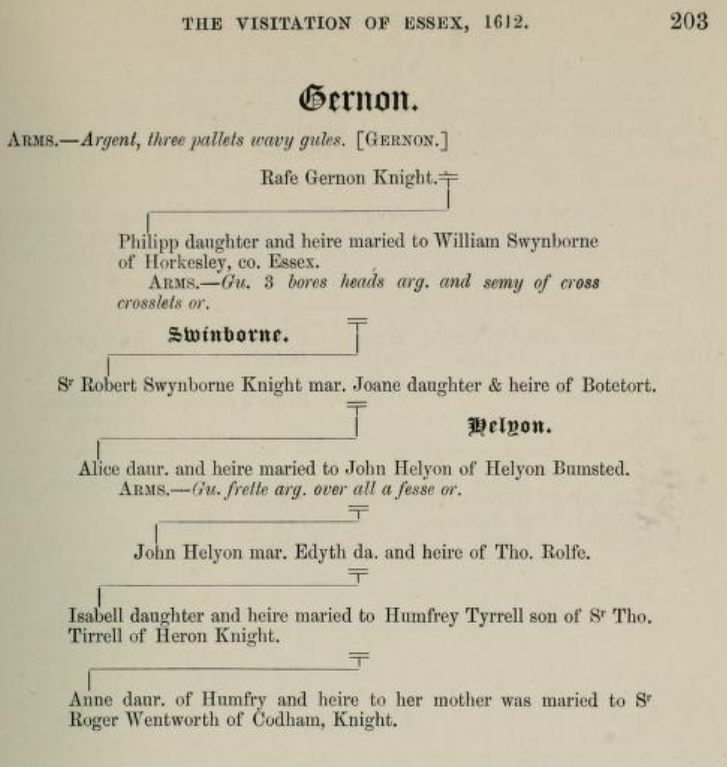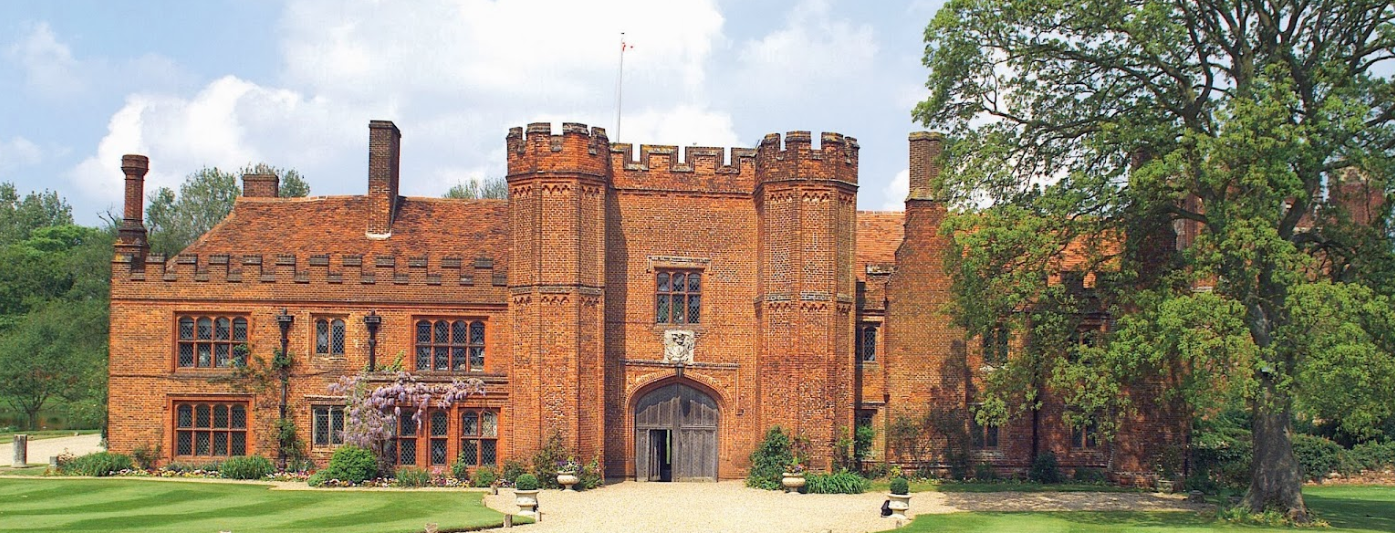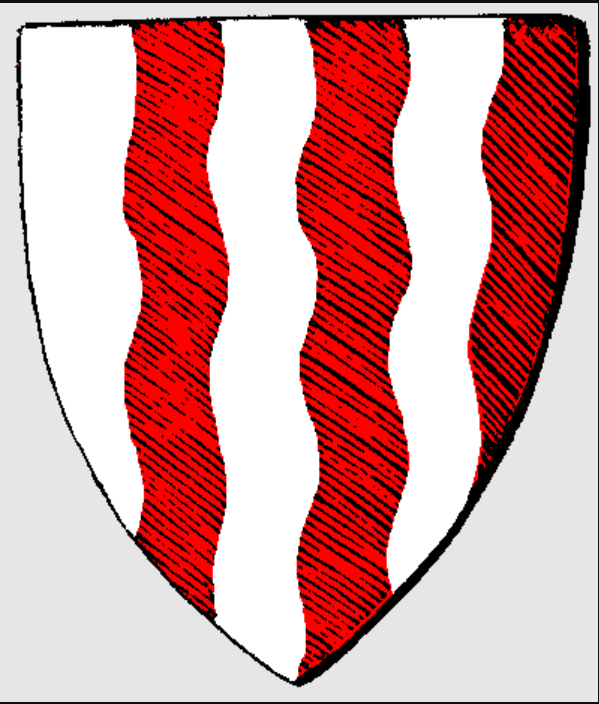Webmaster Notes
A consolidation of what I know about the Gernon family.
Apart from what I managed to deduce from the Visitations the pages from gene.com are not much help. The Gernon's were obviously present in Essex in the 14th century and there was a marriage between a Gernon and a Botetourt.
John Gernon - 1308 - 1384
The Gernon family is connected to the history of Belchamp Walter due a marriage between a Gernon and a Swynbourne. A Swynbourne in turn married a Helion, a Helion a Rolfe, a Rolfe a Tyrell and finally a Tyrell a Wentworth.
According to geni.com John Gernon was knight 1308 - 1384 -
Leez Priory, Little Lees near Chelmsford, Essex.
The families in connection of the Gernon family with Belchamp Walter stems from
the marriage of a daughter to a resident of the manor in the 14th century.
The line of succession was passed between many families associated with the region including
Botetourt,
Swynbourne, Helion,
Rolfe, Tyrrell and Wentworth.
My research on John Gernon the Knight was a little sketchy, as the Wikipedia pages were not much help.
Since starting this page I have located a source for "Visitations" of heralds from 1612.
The initial information came from geni.com, this confirms the Swinborne and
Researching the coat of arms and a reference that I found on the use of a Pax in the Medieval church lead
to the Gernon Family name and Theydon Garnon, Essex.
Sir John de Boutetourt's son, who was living at Belchamp Walter manor in 1340's.
He married Joan the daugther of John Gernon.
It is believed that John Botetourt and Joan (Gernon) were living in the hall in the 1340's
Apparently, John Gernon was a rich knight. His daughters Elizabeth and Joan
The estate of Sir John Botetourt, 2nd Lord Botetourt, was passed on to the Swynbourne family
Top
The marriage of Philipp(a) Gernon to William Synbourne. The marriage of
Sir Robert Swynbourne to
Joane Botetort.
Thomas Wright said:
Sir John Botetourt..... with respect to the marriage of Joan Gernon to John Botetourt (III)
..... on his death, in 1339, to left his only son, Sir John,
his successor.
The Geni.com does not mention who Sir John's son was and who the young Sir John, married.
However, Thomas Wright in his Hstory and Topography of Essex, goes on to say:
He married Joan, daughter and co-heiress of John Gernon, of the family of
Stansted Montfitchet,
whose only daughter was named after her mother; she was a very rich heiress, conveying the large possessions
of the Botetourts and Gernons to her husband, Sir Robert Swynborne,
of Little Horksley.
Notes from geni.com
Son of Sir John Gernon, Sr. and Alice de Gernon
Husband of Isabel Gernon
Father of Elizabeth Rycote (Gernon) and Joan Gernon
Daughter of Sir John Gernon, Kt. and Isabel Gernon
Sister of Elizabeth Rycote (Gernon)
Joan, daughter and heiress of John Gernon, married John Botetourt and had by him a daughter,
Joan, who married Robert Swynburne, Knight.[2][1]
Parents: John Gernon,[2] Knight, of East Thorpe, Essex and Alice ____[1]
Husband: John Botetourt of Belchamp Otton, Belchamp Walter, Gosfield, Gestingthorpe, and Ovington, Essex, son and heir of
John Botetourt, K.B.[1] (d 1339) of Gestingthorp and Belchamp Otto, Essex by his wife Margaret.[2]
John Botetourt was born about 1330 (aged 9 in 1339).[1]
Daughter: Joan Botetourt, daughter and heiress, was born about 1353 (23 in 1376).
She married Robert Swynborne, Knight, as his second wife before 13 November 1371 (date of presentment).
He was born about 1327.[1]
Died: Joan (Gernon) Botetourt died before 1384. Her husband died before 1376.[1]
Stansted Montfitchet
Stansted Montfitchet
Stansted Mountfitchet is an English village and civil parish in Uttlesford district, Essex, near the Hertfordshire
border, 35 miles (56 km) north of London.
According to the 2001 census it had a population of 5,533, increasing to 6,011 at the 2011 census.
Leez Priory
From the Wikipedia page on Leez Priory
In 1220, Sir Ralph Gernon decided that the hamlet of Leez, in a dip by the banks of the River Ter, would provide the
perfect
location on which to found a house of Augustinian canons. The priory of St. Mary and St. John the Evangelist thrived
for over 300 years. King Henry VIII sent Sir Richard Rich to dismiss the monastery, during the Dissolution of the
Monasteries (1536-1541). When Sir Richard Rich, 3rd Baron Rich became the Earl of Warwick, he built his own great house
on the site that is now known as Leez Priory. The remains of the Augustinian Priory are very much in evidence within
the grounds to the south of the existing buildings, including extensive underground drainage conduits.
Known as "Delicious Leez", both the site and the rose-brick buildings are breathtaking,
with old garden walls and fish ponds indicative of life and times past.
The Gernon Coat of Arms - from heraldsnet.org
William GERNON, oundee de long d'argent et de goules--Roll, temp. HEN. III.
Sire William GERNOUN, d'argent a iij peus[=pales] undes de gulys--Roll, temp. ED. II.
Sir William de Gernon of Stanstead and Bakewell was born about 1190, in Stansted Village, Essex.
From the BHO listing for Theydon Garnon
In 1305 the king granted to Hugh Gernon a weekly market and an annual fair at his manor of Theydon Garnon.
(Cal. Chart. R. 1300-26, 62)
The footnotes on the BHO website are not really useful. The (Cal. Chart. R. 1300-26, 62) would be useful if it were
explained.
From Thomas Wright's History and Topography of Essex, 1831/36
Lees priory and manor.
The priory stood rather more than a mile north from the church, at the extremity of the
parish adjoining to Felsted; it was founded in the reign of King Henry the Third, about the year 1230,
by Sir Ralph Gernon, Knt., for Augustine canons, and dedicated to the Virgin Mary and St. John the Evangelist.
The buildings were extensive and magnificent, and there was a spacious park and pleasant gardens.
The advowson and patronage remained in the heirs of the founder till the suppression of monasteries,
when it was of the annual value of £114 . Os . 4d . according to Dugdale. The founder died in the thirty - second of
Henry the Third.
William was his son and heir; and Sir John Gernon,
the last male of this family of the direct line, died in the seventh of Richard the Second, leaving only two
daughters:
Joan the wife of John, son and heir of John, Lord Botetourt; and Margaret, the wife of Sir John de Peyton.
Joan had by Botetourt a daughter called Joan, married to Sir Robert Swinborne, one of whose daughters and co-heiresses
was married to John Helion, and had by him, John, who married Editha, daughter and heiress of Thomas Rolf, Esq. of
Gosfield Hall, and died the twenty - eighth of Henry the Sixth, possessed of the manor of Gerners,
so called from a branch of the Gernon family seated in Warmingford,
to which manor the advowson of the priory and church of Lees belonged, being holden of the king, in capite ,
of his duchy of Lancaster . Editha surviving him , was again married , and enjoyed these estates till her death in
1498. By Helion she had Philippa and Isabella.
Isabella was married to Humphrey Tyrell, Esq., of Warley, by whom she had Anne, married to Sir Roger Wentworth,
of Cobham Hall; and he, in her right, presented to this abbey and church ; before her decease , this house was dissolved ,
and in the king's hands. On this event the king granted this priory, with the manors of Little Lees, Camsey ,
Berns and Herons , in Great and Little Lees , and an annual pension of five marks issuing out of the rectory
and church of Great Birch , to Sir Richard Rich, chancellor of the court of augmentation, an eminent lawyer,
whose talents rendered him a very useful assistant in the suppression of religious houses.
The building:
On gaining possession of the priory, Sir Richard made great alterations in the buildings,
which he enlarged, and formed into a magnificent dwelling, the capital seat for himself and family.
It was built of brick, and consisted of two quadrangles , surrounding an outer and inner court, the latter
of which was faced with free-stone and hard mortar . There was also a spacious banqueting house, and the
gardens were laid out with taste and elegance . The oldest records give an account of a park here,
and that which surrounded the priory consisted of four hundred acres : to this Sir Richard added two other
parks of nearly equal extent ; and other improvements were made by his successors , by which it became so
attractive in its appearance , that on the death of Charles Rich, earl of Warwick , in 1673 , Dr. Walker ,
in his funeral sermon, speaks of it as "a secular elysium ; a worldly paradise; a heaven upon earth."
The Princess Elizabeth was confined here during some part of the reign of her sister Mary.
The family of which Sir Rich family. Richard was the progenitor, and which was seated here in great splendour
upwards of a century, were originally from Hampshire, where John le Rich flourished at Rich's Place , about the
time of Edward the Second . His great grandson, Richard Rich, Esq.,
was of London ; he died in 1414 , and was buried in St. Lawrence's church in
Ivy Lane, leaving his son Richard Rich , a mercer , sheriff of London in 1441 , who acquired great riches ;
he died in 1469 , leaving two sons : John , from whom descended the Riches of Southweald, and Horndon , in Essex ,
of which branch of the family was Sir Robert Rich, master in chancery in 1620 ; and Thomas, who married Meyne of London,
by whom he had Richard , who married Joan , daughter of Dingley , and had by her several sons ; of which Richard studied
the law in the Middle Temple , and by becoming the obsequious tool of that tyran- nical prince , Henry the Eighth ,
raised himself to the most profitable employments , and to the honour of a baron of the realm.
* In 1529 he was chosen autumn reader of the Middle Temple ; in 1532 appointed, by the king , attorney general in
Wales and its marches , for life ; the following year he became solicitor - general to his majesty ;
and two years afterwards had granted him the profitable office of chiro- grapher of the king's bench .
On the dissolution of monasteries he was appointed chancellor of the court of augmentation ,
which gave him an opportunity , not only of getting this priory but of greatly enriching himself otherwise
with the spoils of the religious houses .
In 1544 , he was treasurer of the king's wars both in France and Scotland . Two years afterwards king Henry,
in his will made him one of the assistants to his executors. King Edward the Sixth , in 1546 , created him
Baron Rich of Leex , and , the following year , made him lord chancellor of England .
But endeavouring privately to serve the duke of Somerset during his troubles , and being discovered , he was forced to resign the seal , in 1551 ; on which he retired to his seat at Lees , where he employed himself in charitable works , founding a free school , and an almshouse , at Felsted . He died at his house at Rochford , and was buried at Felsted . He continued a papist , though he was very instrumental in sup- pressing the monasteries , for the sake undoubtedly of sharing their plunder . From the inquisition taken after his decease , it appears that he was possessed of immense estates in different parts of the county. Lord Rich married Elizabeth , daughter of Thomas Jenks , of London , by whom he had Robert , his heir , and three other sons , and nine daughters;
he had also , of illegitimate offspring , a son and three daughters
Richard Rich
Richard Rich having the job of administering the appropriation of buildings that were being used a religious
houses, monasteries, priories and abbeys, decide that Leez Priory was a good place to develop his own prodagy house.


